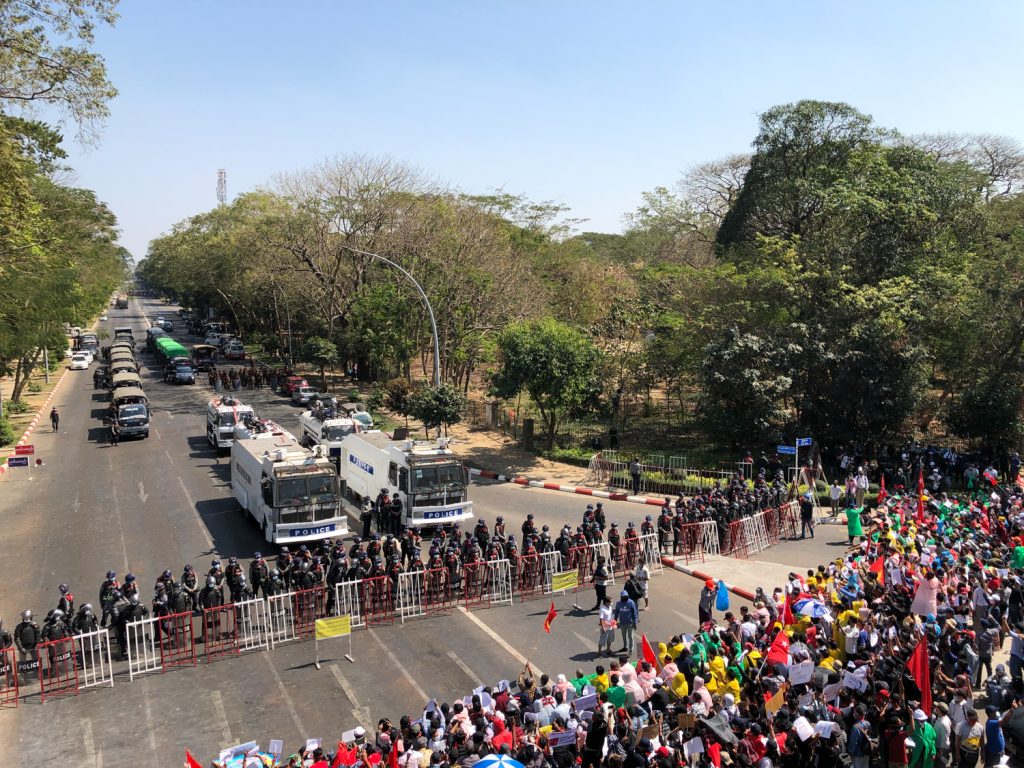Myanmar’s Military Junta: Empty Gestures as an Answer to Revolution
Amid a widening civil war, the military junta is losing control of large parts of Myanmar and is resorting to symbolic politics to try to legitimise itself – the August elections were postponed.
Myanmar’s military junta recently issued a partial amnesty for ousted former head of government and Nobel laureate Aung San Suu Kyi and former president Win Myint. In a mass pardon of more than 7,000 detainees on a Buddhist holiday, the former head of government’s prison sentence was reduced from 33 to 27 years. Former President Win Myint was given 4 years off his 12-year sentence. Shortly before, reports had circulated of Aung San Suu Kyi’s transfer from prison to house arrest in the capital Naypyitaw. However, these developments do not represent a policy shift or the beginning of reconciliation, but rather symbolic politics to try to restore waning domestic support and counter widespread foreign policy isolation.
After the military coup in February 2021, the peaceful resistance movement faced massive repression, which led to the radicalisation of resistance in the country.
A variety of ethnic armies are fighting against the armed forces of Myanmar, called Tatmandaw or Sit Tat, in addition to the exiled National Unity Government, which is made up of a group of ousted former parliamentarians (Committee Representing Pyidaungsu Hluttaw, CRPH) and coordinates an armed wing (People’s Defense Forces, PDF) of around 65,000 fighters.
The military’s waning control
There has long been talk of a revolution to forge a new beginning without Burma’s military which ruled directly or indirectly for more than 60 years, but has now ceded control of parts of the country. The latest BTI Country Report on Myanmar 2022 states: “Large parts in the west (Rakhine and Chin States) and the northeast (Kachin, Shan) are contested terrain. Approximately 15 major and several dozen smaller ethnic armed organizations fight for autonomy or secession from the union.”
According to reports from foreign experts, the military has lost its grip on more than half of Myanmar’s 330 districts. It now only controls the larger towns in the Buddhist heartland, while civil war has flared up again in the northwest (in the Rakhine and Chin ethnic areas) as well as in the northeast (Kachin) and east (Karen).
The difficult situation for the military junta is underscored by the fact that on 31 July 2023, the state of emergency was extended for a fourth time for six months – against the stipulations of the constitution. Meanwhile, elections planned for 2023, which should have given the junta legitimacy, were cancelled.
Since the return to direct military rule in 2021, there has been a reversal of much of the progress made politically, economically and socially since 2012. The country’s manifold problems have worsened and a humanitarian crisis has long been under discussion. The renewed civil war has resulted in thousands of deaths and more than 1.5 million internally displaced persons. In addition, there is widespread repression. According to the Myanmar Human Rights Association of Political Prisoners, more than 24,000 people have been arrested for political reasons since the coup. Of these, 19,733 were still detained at the end of July 2023. The military has killed 3,857 people.
Attempts at legitimacy and empty gestures
The military tries to legitimise itself through Buddhism. In the state media, the Tatmadaw are portrayed as the protecting power of Theravada Buddhism. An analysis by the US Institute for Peace concludes that military chief Min Aung Hlaing sees himself in the tradition of Burmese god-kings and acts as a patron of Buddhism. It is fitting that the military government recently unveiled a statue of Buddha in Naypidaw, the world’s largest, standing 19 metres tall.
The partial amnesties of Aung San Suu Kyi and former President Win Myint are supposed to demonstrate the military’s “goodwill”. However, they remain empty gestures devoid of real political consequences. The transfer of Aung San Suu Kyi to house arrest could above all be a signal to foreign countries, because Myanmar is largely isolated internationally.
The West has imposed sanctions against the military and companies associated with the military. The Association of Southeast Asian Nations, or ASEAN, has largely suspended its cooperation with Myanmar and called on the junta to initiate a dialogue with the resistance movement and ethnic groups – so far without success.
China sees its business interests under threat
The junta is mainly supported by China, India and Russia. While Russia supplies fighter jets to challenge the PDF’s poorly equipped fighters, resulting in high numbers of civilian casualties, China and India have far-reaching economic interests in Myanmar that are being threatened by the escalating civil war.
Since the coup, China has invested more than 113 million US dollars in projects in Myanmar. The so-called China-Myanmar Economic Corridor is intended to link the two countries more closely. China therefore has a strong interest in seeing a settlement of the fighting and a restoration of economic stability. In February 2023, the PDF launched an attack on the 770 km Chinese oil pipeline that runs from Rakhine State to Yunnan in China. Following the development, China appointed a special envoy to negotiate with ethnic groups in the border region. Chinese representatives have also spoken with former leaders Than Shwe and Thein Sein to seek a possible resolution.
Diplomatic exchanges with Suu Kyi, the NLD leader, also seem to have returned to the realm of possibility following her transfer to house arrest. Only last week, Thai Foreign Minister Don Pramudwinai reported that he had met with Suu Kyi to discuss her stance on the civil war. This first confirmed access by a foreign diplomat to the Nobel laureate has been used by the military government for propaganda purposes with the aim of discrediting the resistance.
However, without a genuine willingness to change on the part of the military, nothing will change in Myanmar and the civil war between the conflicting parties will continue. The many PDF and ethnic army fighters would have to join forces or take the capital to win the civil war, but in reality, they are just as far from doing so as the Burmese military.
Translated from the German by Jess Smee

